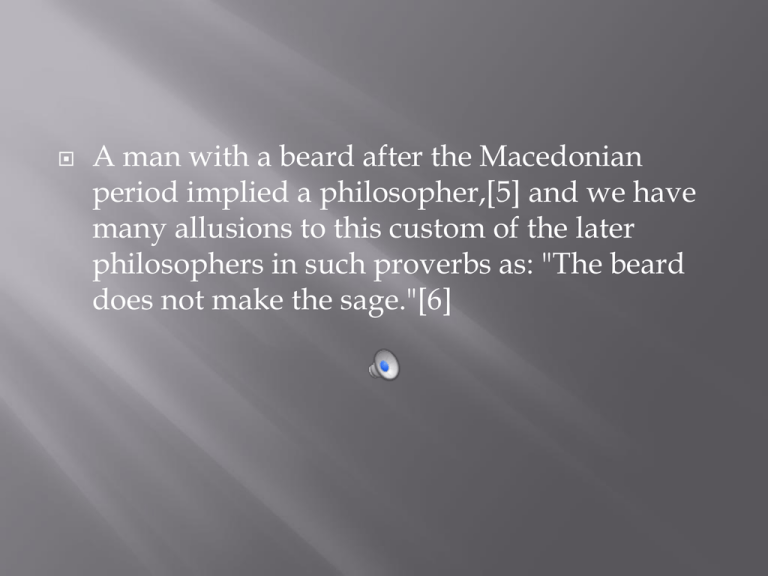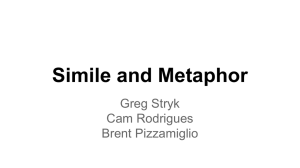beards.pptx
advertisement

A man with a beard after the Macedonian period implied a philosopher,[5] and we have many allusions to this custom of the later philosophers in such proverbs as: "The beard does not make the sage."[6] The first time of shaving was regarded as the beginning of manhood, and the day on which this took place was celebrated as a festival.[9] Usually, this was done when the young Roman assumed the toga virilis. Augustus did it in his twentyfourth year, Caligula in his twentieth. The hair cut off on such occasions was consecrated to a god. Thus Nero put his into a golden box set with pearls, and dedicated it to Jupiter Capitolinus.[10] The Romans, unlike the Greeks, let their beards grow in time of mourning; so did Augustus for the death of Julius Caesar.[ There are several theories as to why the military began shaving beards. When World War I broke out in the 1910s, the use of chemical weapons necessitated that soldiers shave their beards so that gas masks could seal over their faces. A male Rastafarian's beard is a sign of his pact with God (Jah or Jehovah), and his Bible is his source of knowledge. Leviticus 21:5 ("They shall not make baldness upon their head, neither shall they shave off the corner of their beard, nor make any cuttings in the flesh.") Likewise, it is not uncommon for a Rastafarian beard to grow uncombed, like dreadlocks. Professional airline pilots are required to be clean shaven to facilitate a tight seal with auxiliary oxygen masks. In Irish football, a ban on beards has been in place since 2005, when Beechlawn Rovers defender David Murray pulled Chanel striker Ricky Bobby down by his beard when he was clear through on goal. It was feared by the Irish Premier League that this practice would continue; therefore a ban was placed on growing facial hair longer than two inches.[ * Full – downward flowing beard with either styled or integrated moustache * Sideburns – hair grown from the temples down the cheeks toward the jawline. Sometimes with a moustache. * Chinstrap – a beard with long sideburns that comes forward and ends under the chin, resembling a chinstrap, hence the name. * Donegal – similar to the chinstrap beard but, covers the entire chin. * Garibaldi – wide, full beard with rounded bottom and integrated moustache * Goatee – A tuft of hair grown on the chin, sometimes resembling a billy goat's. * Junco – A goatee which extends upward and connects to the corners of the mouth. * Hollywoodian- A beard with integrated mustache that is worn on the lower part of the chin and jaw area, without connecting sideburns. the ears without connecting side burns. # Royale – is a narrow pointed beard extending from the chin. The style was popular in France during the period of the Second Empire, from which it gets its alternative name, the imperial or impériale. # Stubble – a very short beard of only one to a few days growth. This became fashionable during the heyday of Miami Vice. During this time, a modified electric razor called the Miami Device became popular, which would trim stubble to a preset length. # Van Dyck – A goatee accompanied by a moustache. # Verdi – short beard with rounded bottom and slightly shaven cheeks with prominent moustache # Neckbeard (Neard) – Similar to the Chinstrap, but with the chin and jawline shaven, leaving hair to grow only on the neck. While never as popular as other beard styles, a few noted historical figures have worn this type of beard, such as * "There are two kinds of people in this world that go around beardless—boys and women—and I am neither one." -Greek saying * "A woman with a beard looks like a man. A man without a beard looks like a woman." Afghan Saying * "The beard is the handsomeness of the face, and a wife is the joy in a man's heart." - R' Akiva, Eicha Rabbah * "And yet your beards forbid me..." - Banquo, to the witches, in Shakespeare's Macbeth. * "Shaving was a custom of the Macedonian military, taken over by Hellenic and Roman society. From then on the beard becomes a philosophical status symbol, a sign of nonconformism." - Peter Sloterdijk, Critique of Cynical Reason, pg. 210, n.4 “Keep growing that and you can forget about it, ever” -his wife…………..




